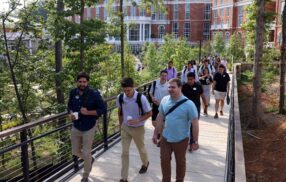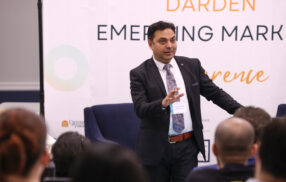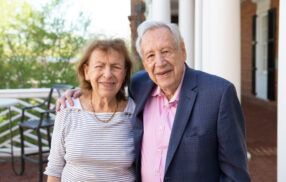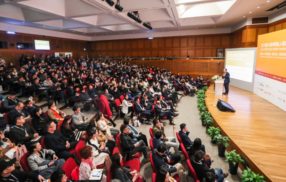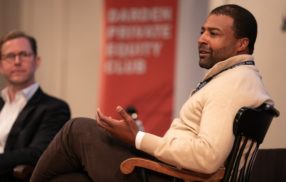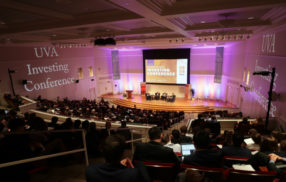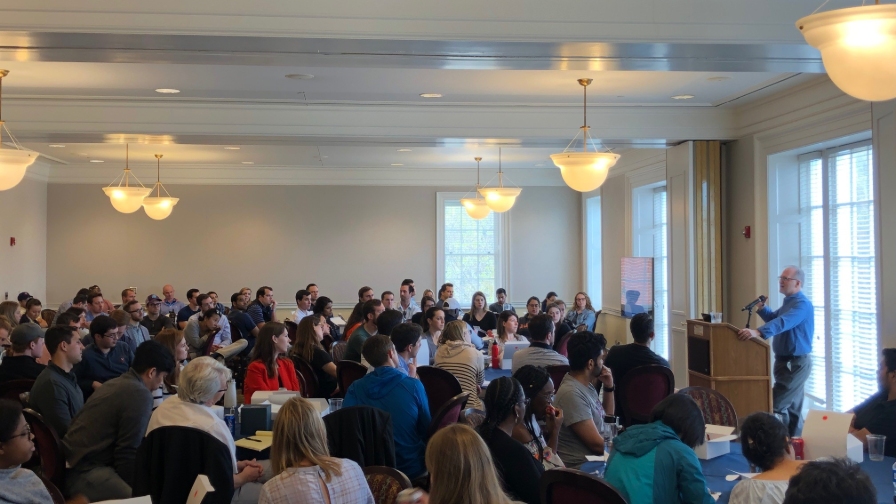
WTO Chief Economist Warns of Global Trade Slowdown, Lauds Power of Teamwork at UVA Darden
By Jay Hodgkins
“I get a headache.”
That quip from World Trade Organization (WTO) Chief Economist Robert Koopman in response to a University of Virginia Darden School of Business student’s question about how he models the incredible level of geopolitical uncertainty in the global economy drew laughter from the more than 100 students from Professor Peter Debaere’s “Managing International Trade and Investment” course. But one could hardly blame Koopman — or any economist, for that matter — for struggling to keep up-to-date economic models in the era of U.S.-China trade spats, Brexit, a broad breakdown in global trade in favor of regional trade agreements, and a continuous stream of ever-shifting statements on policy intentions emanating from Washington, D.C.
“Never in my career have I had this much uncertainty or this many different things going on,” Koopman said. “I can model the U.S.-China tariffs. I can do steel and aluminum. We know what they are. I really can’t do Brexit because I don’t know what Brexit is. Neither do they! Until I know, I really can’t do the analysis. But I can tell you the uncertainty will affect trade. It will affect investment. It will affect foreign direct investment.”
Koopman said most of the uncertainty globally is originating from U.S. actions.
The WTO has done its best to model the known and unknown, recently slashing its 2019 projection for global trade growth to the lowest level in three years, citing rising tariffs and global trade tensions on multiple fronts. Since the WTO released its more pessimistic forecast, Koopman has been publicly warning that the worst could be yet to come if the U.S. follows through on Trump administration threats to introduce new automobile tariffs.
“Let me give you some back-of-the-envelope math,” Koopman told the students. “U.S.-China trade is about 3 percent of global trade. Automobile trade is about 8 percent of global trade. That is a much bigger slice of the pie with big knock-on effects due to the size of the global and local supply chain [supporting the auto industry].”
In recent history, Koopman said tariffs have been a sleepy area of economic analysis, as they are relatively low already and dying off as a political and economic tool globally. Those that did exist did not impact large portions of the economy or merit much attention. However, from China to the U.S. to the European Union, a new generation of tariffs implemented and being discussed have brought the tool screaming back into the headlines for economists.
“If trade policy and tariffs and uncertainty around those tariffs starts to affect the macro components of GDP, consumption and investment, then you get potentially big effects,” Koopman said. “That is a big concern right now, that this trade uncertainty — largely caused by the United States but not exclusively — could be causing the slowdown in investment … and that could then bring about much bigger negative economic effects and lead to a pretty significant economic slowdown if not a recession.”
‘The World Is Teamwork’
Koopman explained that much of his job as chief economist and director of the economic research and statistics division at the WTO involves dispelling myths about the organization, providing advice to WTO member countries if they ask for it and forecasting global trade.
He described the “consensus approach” at the WTO, where a single country among the 164 members has the ability to kill an effort supported by large groups of countries that represent the vast majority of the global economy. While the WTO does have some mechanisms in place to allow agreements supported by less than the full body of 164 members to move forward, affecting only countries that choose to be party to such an agreement, Koopman said the arduous task of consensus-building relies on the familiar skills of teamwork.
“The world is really teamwork,” Koopman said. “Not very often is it me individually. It’s me and my team responding to questions. If you don’t learn to work well in a team and you don’t deliver for a team, in the long term that is going to leave you out.”
The University of Virginia Darden School of Business prepares responsible global leaders through unparalleled transformational learning experiences. Darden’s graduate degree programs (MBA, MSBA and Ph.D.) and Executive Education & Lifelong Learning programs offered by the Darden School Foundation set the stage for a lifetime of career advancement and impact. Darden’s top-ranked faculty, renowned for teaching excellence, inspires and shapes modern business leadership worldwide through research, thought leadership and business publishing. Darden has Grounds in Charlottesville, Virginia, and the Washington, D.C., area and a global community that includes 18,000 alumni in 90 countries. Darden was established in 1955 at the University of Virginia, a top public university founded by Thomas Jefferson in 1819 in Charlottesville, Virginia.
Press Contact
Molly Mitchell
Associate Director of Content Marketing and Social Media
Darden School of Business
University of Virginia
MitchellM@darden.virginia.edu



